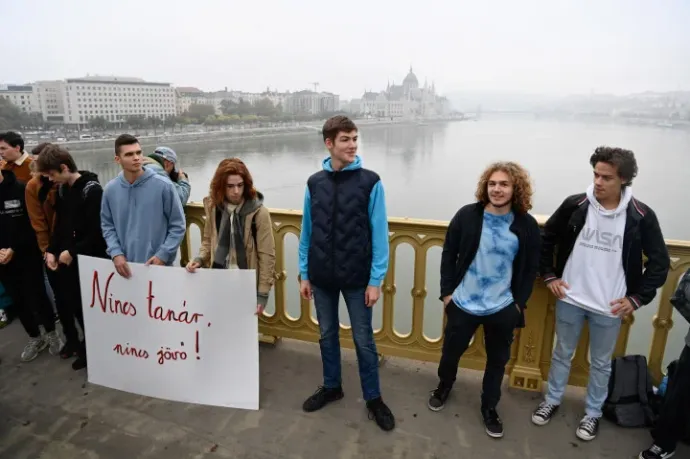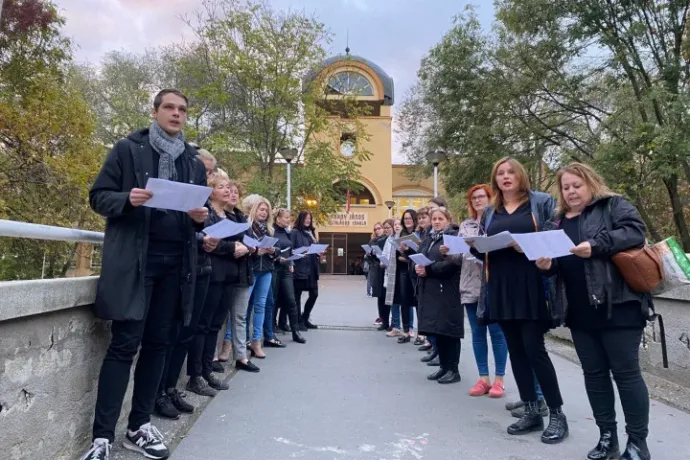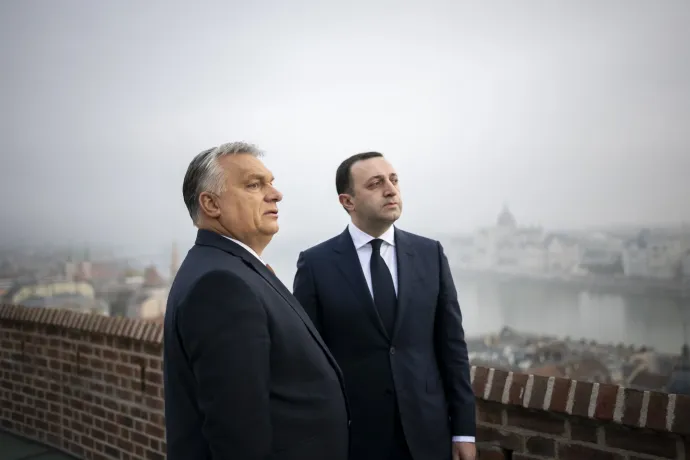Thousands of teachers didn’t take up work in Hungary on Thursday according to Teachers' Unions
October 27. 2022. – 03:19 PM
updated
Several thousand people formed a more than 10 kilometer-long human chain across Budapest on Thursday morning. Parents, grandparents, and students gathered to send a clear message that they stand with the country’s educators and support their demands for higher wages, better working conditions, and the restoration of their right to strike – among others.


Also on Thursday, thousands of teachers all over Hungary are refusing work for the day as part of a country-wide strike organized by the two Teachers’ Unions, PSZ and PDSZ. It would be impossible to list all the locations, but with reports from Nagykanizsa, Ócsa, Szeged, Kőszeg, Székesfehérvár, Páty, Dorog, Dunakeszi, Soroksár, Zalahaláp, Hódmezővásárhely, Ecséd, Nyíregyháza, and many more, it is safe to say that today’s event was truly one that the whole country was represented in.
The staff of Csontváry Általános Iskola és Alapfokú Művészetoktatási Intézmény in Zalahaláp published an open letter explaining their reasons for not taking up work today. In it, among others, they say:
On Thursday, October 27, 2022, in Zalahaláp, all members of the staff (both teachers and technical staff) of Csontváry Általános Iskola és Alapfokú Művészetoktatási Intézmény are not taking up work. We will not carry out educational and training activities today, and will not be supervising children, because the government has curtailed our right to strike. (...)
With our protest, we want to draw attention to the very serious problems in education, about which the government has not made any substantive decisions for years. This includes the issues that have no budgetary impact. That is why we are calling for a professional dialogue on the structural reform of education, the elimination of the teacher shortage, the reduction of the workload, the revision of the National Curriculum, the modernisation of public education, and much more."
While this morning’s human chain and protest for the education system was going on across the capital, Prime Minister Viktor Orbán was meeting with Georgian President Irakli Garibashvili at the Prime Minister's Offices overlooking the city.

More events are planned for the weeks ahead
One of the Teachers’ Unions, PDSZ announced at a press conference held this morning that the next country-wide strike will be held on 18 November.
Erzsébet Nagy, PDSZ's managing executive added that there would be a debate on the state of public education in Parliament on 2 November, which will be attended by many teachers and students.
She also added that State Secretary for Public Education, Zoltán Maruzsa had invited the representatives of the teachers' strike committee to a meeting with him on 7 November.
On 22 November, the Day of Hungarian Public Education, teachers will teach lessons about democracy, and on 26 November, from 3pm, a "real national consultation" on education will be held on Kossuth tér in Budapest, as Gábor Gosztonyi, a representative of the Teachers' Trade Union (PSZ) announced.
Katalin Törley, a member of Tanítanék Movement and one of the educators recently fired from Budapest's Kölcsey Gimnázium for practicing civil disobedience, also spoke at the press conference. She said that protesting should not be given up and that she herself considers civil disobedience the best solution in the current situation, because teachers have not yet been given back their right to strike. Until there is a result, teachers will not stop protesting," Törley added.
Hungarian Teachers’ Unions sent their first open letter to prime minister Orbán in October 2021, and since there was no response, they recently sent their second open letter, asking the PM to sit down for talks with their representatives.
This fall has been marked by almost daily protests and various events demanding changes, across Hungary, organized not only by teachers, but parents and students as well. A few weeks ago, Gergely Gulyás, Minister heading the PM's Office announced that the government would begin a process of gradually increasing Hungarian teachers’ wages in January, and said that the total increase would be 80 percent of the average tertiary graduate salaries by 2025.
The teachers’ unions, however, were not impressed, as they said that upon closer examination, and including the current and expected inflation rates in the calculation, the raise would only amount to a 6% increase in five years’ time. They also added that they have several more demands, and reiterated their request for sit-down negotiations with the authorities.
For more quick, accurate and impartial news from and about Hungary, subscribe to the Telex English newsletter!